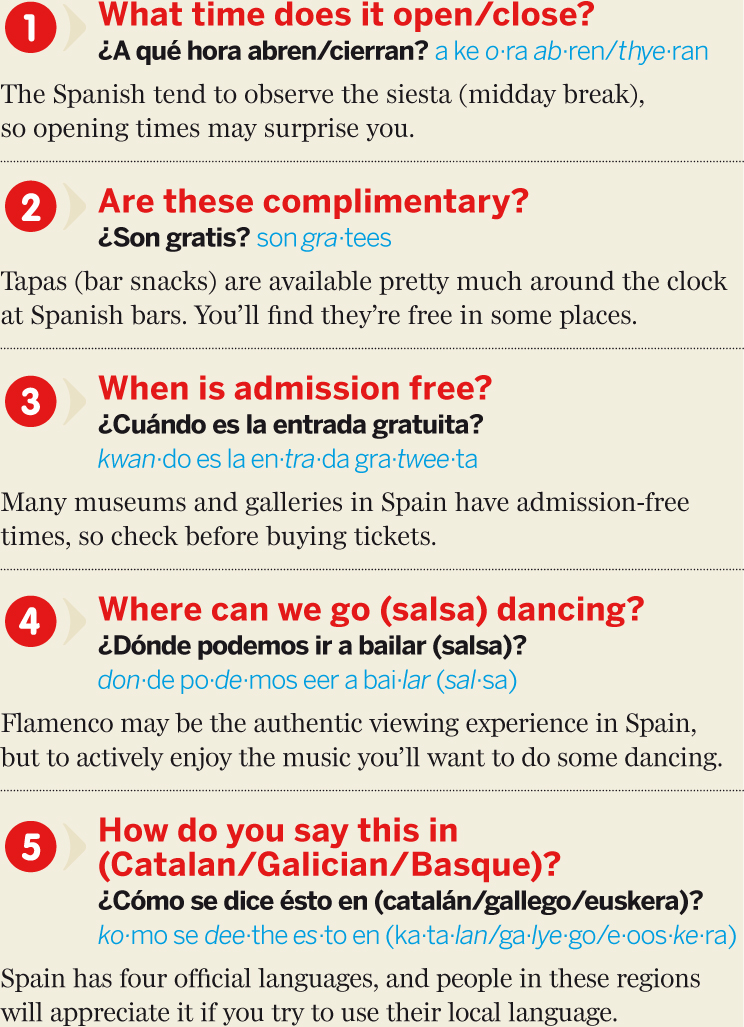First Time Spain
For more information, see Survival Guide.
Checklist
AWith huge airfare differences, check all airlines before booking your flight.
ACheck if you can use your phone in Spain and ask about roaming charges.
AAt the very least, book your first night's accommodation to ensure an easy start to your trip.
ACheck the calendar to work out which festivals to visit or avoid.
AOrganise travel insurance.
What to Pack
APassport and/or national ID card (EU citizens) and carry it on you.
ASpanish phrasebook – not everyone speaks English.
AMoney belt, and padlock for your suitcase/backpack.
AHeadphones for bus or train journeys and Skype calls.
ATwo-pin continental Europe travel plug.
AEarplugs for noisy Spanish nights.
ARenfe (train) app and a hiking one downloaded to your phone.
Top Tips for Your Trip
ATo blend in with the locals (and avoid going hungry), adjust your body clock on arrival. In no time at all you'll be eating lunch at 2.30pm and dinner at 9pm.
AA few words of Spanish can go a long way. English is widely (but not universally) spoken.
ASpain is a food-obsessed country and you'll miss half the fun if you don't join in – linger over your meals and always ask for the local speciality.
AUnless you're in a hurry, avoid the motorways and take the scenic back roads.
AGet used to having less personal space and being surrounded by high-volume conversations.
What to Wear
Spain has come a long way since the 1950s when visiting tourists were fined and escorted from Spanish beaches by police for wearing bikinis. Just about anything goes now, and you'll rarely feel uncomfortable because of what you're wearing. Northern Spain and much of the interior can be bitterly cold in winter – come prepared with plenty of warm clothing. You should also carry some form of wet-weather gear if you're in the northwest. Spaniards are generally quite fashion-conscious and well-dressed – in the cities in particular, they rarely dip below smart casual.
Sleeping
Accommodation in Spain can be outrageously good value by European standards. Reserving a room is always recommended in the high season.
AParadors These state-run hotels often inhabit stunning historic buildings and can be surprisingly well-priced, especially off-season.
AHotels Everything from boutique to family-run with an equally wide range of rates.
AHostales Small, simpler yet comfortable hotel-style places, often with private bathrooms.
ACasas Rurales Rural homes with usually rustic, simple rooms that can be reserved individually or as a block.
ACamping & Youth Hostels For the budget-minded traveller. Quality varies but they're great places to meet other travellers.
Money
Paying with a credit card is widespread in Spain (except in many bars), although there may be a minimum (€5 to €10). Visa and MasterCard are almost always accepted, American Express less so. When paying with a credit card, photo ID (eg passport or driving licence) is required, even where you're required to enter your PIN.
ATMs are everywhere and most allow you to use international credit or debit cards to withdraw money in euros (always check the display showing which cards you can use). There is usually a charge (1.5% to 2%) on ATM cash withdrawals abroad – check with your bank before leaving home.
Bargaining
Haggling over prices is accepted in some markets, and shops may offer a small discount if you're spending a lot of money. Otherwise expect to pay the stated price.
Tipping
AWhen to Tip Tipping is almost always optional.
ARestaurants Many Spaniards leave small change, others up to 5%, which is considered generous.
ATaxis Optional, but most locals round up to the nearest euro.
ABars It's rare to leave a tip in bars (even if the bartender gives you your change on a small dish).
Etiquette
AGreetings Spaniards almost always greet friends and strangers alike with a kiss on each cheek, although two males only do this if they're close friends. It is customary to say 'Hola, buenos días' or 'Hola, buenas tardes' (in the afternoon or evening) when meeting someone or when entering a shop or bar, and 'hasta luego' when leaving.
AEating & Drinking Spanish waiters won't expect you to thank them every time they bring you something, but they may expect you to keep your cutlery between courses in more casual bars and restaurants.
AVisiting Churches It is considered disrespectful to visit churches for the purposes of tourism during Mass and other worship services.
AEscalators Always stand on the right to let people pass.
Language
English is quite widely spoken, especially in larger cities and popular tourist areas, less so in rural villages and among older Spaniards. Learning a little Spanish before you come will, however, greatly increase your appreciation of the country, not least through your ability to converse with locals. Many restaurants (but by no means all) now have English-language menus, but some museums have labels only in Spanish.
Phrases to Learn Before You Go
